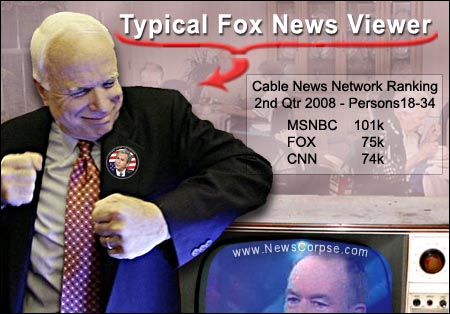The Broadcasting Board of Governors (BBG) is the federal agency responsible for all U.S. government and government sponsored, non-military, international broadcasting. Its affiliates include the Voice of America, Alhurra, Radio Free Europe, and Radio and TV MartÃ. If its mission was not originally intended to be a purveyor of propaganda, the Bush administration has seen to it that that is what it has become.
Now President Bush has made his latest attempt to further mire the agency in disgrace by nominating Clifford May to the Board. May is a former Republican National Committee communications director and the President of the Foundation for the Defense of Democracies, whose list of directors and advisors reads like a who’s who of neocon warmongers. He is an advocate of torture abroad, the suspension of civil liberties at home, and always the supremacy of America by virtue of its military might. As a writer for the National Review and a frequent guest on television news programs, he has a record of deliberately inflammatory and partisan rhetoric. Here are a few examples:
On coddling terrorists: “[Democrats] demand that foreign terrorists abroad be given the same privacy protections enjoyed by American citizens here at home.”
Actually, Democrats were demanding that Americans be given the privacy protections they are promised by the Constitution.
On the success of the surge: “…the threat of an Iraqi civil war has diminished and there is no ‘resistance’ movement to speak of.”
Since May made this claim, 236 more American troops died in Iraq, along with 4,591 Iraqis.
On the Left as traitors: “…some of those on the left who would like to see America defeated in Iraq as a demonstration exercise that U.S. power never, never can be used for good.”
Setting aside the repulsive assertion that the Left is rooting for defeat, May erroneously implies that there is some good in BushCo’s occupation of Iraq.
This isn’t the first time Bush has used the BBG for blatantly political purposes. He had previously installed the utterly corrupt Kenneth Tomlinson as chairman. Tomlinson, thankfully, didn’t last long.
The circumstances proximate to May’s nomination further illustrate Bush’s purposeful mission to staff the BBG with faithful cronies. To make way for May, Bush had to withdraw his previous nominee, Mark McKinnon. McKinnon himself is a loyal Republican who worked on both Bush presidential campaigns. He was also a sitting member of the Board, having received a recess appointment from Bush in December of 2006. McKinnon’s fate was sealed, however, when earlier this year he resigned his post as the lead media consultant for John McCain saying…
“I just don’t want to work against an Obama candidacy. [Electing Obama] would send a great message to the country and the world.”
Despite insisting that he remains a “friend and fan” of the McCain campaign, whatever loyalty and qualifications he had that justified his prior service and nomination were null and void as he no longer displayed sufficient unquestioning partisanship. The Bushies require greater obsequiousness than that.
May still needs to be confirmed by the Senate to take a seat on the Board. With less than six months remaining in Bush’s term it would be idiocy for the Senate to do so. That obviously doesn’t rule out the possibility that they will. The FISA bill that the Senate passed last week was fully in line with May’s position on the issue. And it passed with Barack Obama’s vote. That should be an indication of how much we can rely on the Senate to do the right thing.


